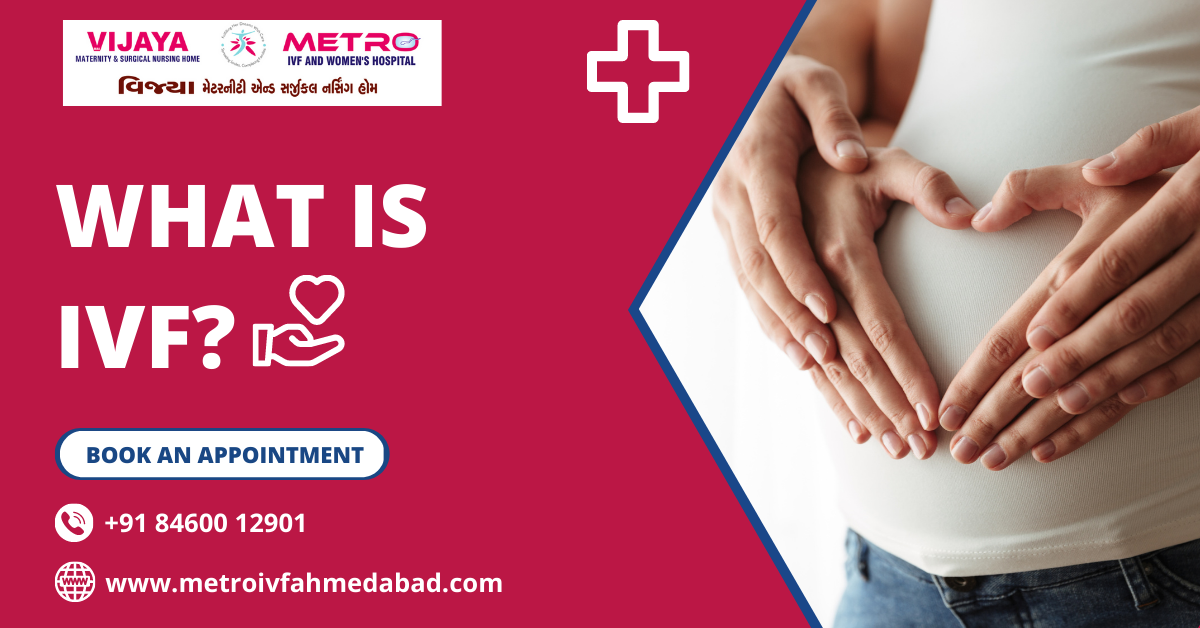IVF Treatment in Ahmedabad
IVF stands for In-Vitro Fertilization. It’s a medical procedure in which an egg is fertilized by sperm outside the body, in a laboratory dish. The fertilized egg is then transferred to the uterus for pregnancy to occur. IVF is a type of assisted reproductive technology (ART) used to treat infertility and other reproductive disorders. It’s often recommended for couples and individuals who have been unable to conceive through other methods, such as natural conception or less invasive treatments like fertility drugs.
IVF is a multi-step process that includes:
Ovarian stimulation: Medications are given to the patient to stimulate the ovaries to produce multiple eggs.
Egg retrieval: The eggs are then collected from the ovaries using a needle guided by ultrasound.
Fertilization: The collected eggs are fertilized with sperm in a laboratory dish, either through traditional insemination or intracytoplasmic sperm injection (ICSI).
Embryo culture: The fertilized eggs, now embryos, are grown in a laboratory for several days.
Embryo transfer: The embryos are then placed in the uterus, either through a catheter or a small incision in the abdomen.
It’s important to note that not all embryos will result in a pregnancy, and multiple rounds of IVF may be necessary to achieve a successful pregnancy. IVF also comes with certain risks, such as ovarian hyperstimulation syndrome, infection, and bleeding. It’s advisable to consult with a fertility specialist for more information about the procedure and to determine if IVF is the appropriate treatment for you.
IVF treatment is a multi-step process that typically involves several stages, including:
- Ovarian stimulation: Medications are given to the patient to stimulate the ovaries to produce multiple eggs. This is done to increase the chances of success.
- Egg retrieval: The eggs are then collected from the ovaries using a needle guided by ultrasound.
- Fertilization: The collected eggs are fertilized with sperm in a laboratory dish. This can be done through traditional insemination or intracytoplasmic sperm injection (ICSI).
- Embryo culture: The fertilized eggs, now embryos, are grown in a laboratory for several days.
- Embryo transfer: The embryos are then placed in the uterus, either through a catheter or a small incision in the abdomen.
It’s important to note that not all embryos will result in a pregnancy, and multiple rounds of IVF may be necessary to achieve a successful pregnancy. IVF also comes with certain risks, such as ovarian hyperstimulation syndrome, infection, and bleeding. It’s advisable to consult with a fertility specialist for more information about the procedure and to determine if IVF is the appropriate treatment for you.
There are also other variations of IVF treatment such as IVF-ICSI (Intracytoplasmic Sperm Injection) where a single sperm is directly injected into the egg, and IVF-PGT (Preimplantation Genetic Testing) which can be used to screen embryos for genetic disorders before they are transferred to the uterus.
Importance of IVF Treatment
IVF (In-Vitro Fertilization) treatment is an important medical procedure for couples and individuals who are struggling to conceive. It can help individuals with fertility problems to have biological children, which can be an important emotional and psychological goal. The following are some of the main reasons why IVF treatment is considered important:
- Infertility treatment: IVF can be used to diagnose and treat many causes of infertility, such as blocked fallopian tubes, endometriosis, and low sperm count. It can also be used to preserve fertility in individuals undergoing medical treatments such as chemotherapy or radiation therapy that may damage the reproductive system.
- Assisted reproductive technologies (ART): IVF allows for the use of assisted reproductive technologies such as intracytoplasmic sperm injection (ICSI) and preimplantation genetic testing (PGT) that can help to improve the chances of successful pregnancy and healthy babies.
- Genetic disorders: IVF treatment can also be used to screen embryos for genetic disorders before they are transferred to the uterus.
- Same-sex couples and single people: IVF treatment can also be used by same-sex couples and single individuals who want to start a family
- High success rate: IVF treatment has a high success rate and can be considered as the most effective infertility treatment method.
Overall, IVF treatment is a powerful tool in the field of reproductive medicine that can help many couples and individuals achieve their dream of starting a family.

